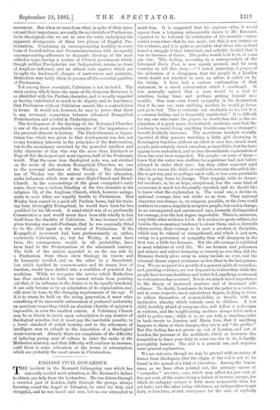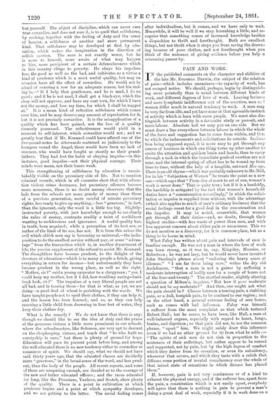ENGLISH CIVIL COWARDICE.
THE incident in the Kennard kidnapping case which has naturally excited most attention, is Mr. Kennard's failure to obtain any help from the bystanders. He was driven through a crowded part of London, right through the groups always hovering round the Angel at Islington, he cried for help and struggled, and he was heard and seen, but no one attempted to
We are not sure, though we may be greeted with an outcry of horror from ideologues, that the origin of the evil is not to be found in the spread of a kind of education. Among the braver races, as we have often pointed out, the primary causes of " cowardice " are two,—one, which may affect ten per cent. or five per cent. of the males being a failure of nervous energy, for which its unhappy subject is little more responsible than for red hair; and the other being selfishness, an indisposition to get hurt, or lose time, or risk annoyance for the sake of anybody
but yourself. The object of discipline, which can never cure true cowardice, and does not cure it, is to quell that selfishness, by evoking, together with the feeling of duty and the sense of honour, a selfishness of another and more permanent kind. That selfishness may be developed at first by edu- cation, which wakes the imagination in the direction of selfish caution. The man is not exactly worse, but he is more to himself, more aware of what may happen to him, more percipient of a certain defencelessness which in this country clings to poverty. He obeys his impulses less, the good as well as the bad, and cultivates as a virtue a kind of prudence which is a most useful quality, but may on occasion have all the effect of cowardice. He would not be afraid of entering a row for an adequate reason, but his feel- ing is,—" If I help that gentleman, and he is mad, I do no good ; and if he is not mad, I shall get a black-eye, which the shop will not approve, and have my coat torn, for which I have not the money, and lose my time, for which I shall be nagged at." It is a mean kind of reflective selfishness which comes over him, and he may deserve any amount of reprobation for it, but it is not precisely cowardice. It is the misapplication of a quality which has been gained, not the loss of a quality formerly possessed. The reflectiveness would yield in a moment to self-interest, which cowardice would not ; and we greatly fear that if Mr. Kennard could have offered one of the five-pound-notes he afterwards scattered so judiciously to the loungers round the Angel, there would have been no lack of rescuers, who would have fought as stoutly as their grand- fathers. They had lost the habit of obeying impulse—in this instance, good impulse—not their physical courage. Their minds were mean, not their knees weak.
This strengthening of selfishness by education is unmis- takably visible on the pecuniary side of life. Not to mention criminal records, which in all countries show that with educa- tion violent crime decreases, but pecuniary offences become more numerous, there is no doubt among observers that the lads from the schools are more greedy of money than those of a previous generation, more careful of minute pecuniary rights, less ready to give up anything,—less "generous," in fact, than the ignorant, only the word is a little too big. Slightly- instructed poverty, with just knowledge enough to see clearly the value of money, contracts readily a taint of sordidness wanting to recklessness and ignorance. A useful quality has, in truth, been acquired ; while a perception of its best use, or rather of the limit of its use, has not. It is from this arises the evil which oldish men say is becoming so universal,—the indis- position to do the smallest service without pay, or some " advan- tage " from the transaction which is, in another department of life, the precise supplement of the refusal to assist Mr. Kennard. The thoughtless have become prudent, to the delight of the devotees of education—which is to many people a fetish, giving everything in return for incense—but unfortunately they have become prudent in the wrong place, as well as the right. "Mother, sir ?" said a young carpenter to a clergyman ; "yes, I could keep my mother, but if I did, how would my savings-bank book look, sir ?" The impulses of a very liberal people are not all bad, and in taming them—for that is what, as yet, we are doing—a good deal of wheat is perishing with the weeds. We have taught people not to spoil their clothes, if they can help it, and the lesson has been learned ; and so, as they can help rescuing a little child from drowning in four feet of water, they keep their clothes dry.
What is the remedy ? We do not know that there is any; though we should like to see the idea of duty and the praise of the generous virtues a little more prominent in our schools, where the schoolmasters, like Solomon, are very apt to descant on the shopkeeping virtues, and teach that "lie who hath no suretyship is sure," but there is plenty of ground for hope. Education will pass its present point before long, and among the well educated there is no new tendency either to cowardice or meanness of spirit. We should say, what we should not have said thirty years ago, that the educated classes are decidedly more "generous," in the broad sense of the word, and less prud- ent, than the body of the people. All recent reports, and some of them are unsparing enough, are decided as to the courage of the new and better educated officers ; and the races educated for long, like the Prussians, Yankees, and Scotch, show plenty of the quality. There is a point in cultivation at which prudence begins and a point at which sympathy developes, and we are getting to the latter. The social feeling comes after individualism, but it comes, and we have only to wait. Meanwhile, it will be well if we stop hurrahing a little, and re- cognise that something comes of increased knowledge besides a disposition to thrift and forethought. Both are excellent things, but not thrift when it stops you from saving the drown- ing because of your clothes, and not forethought when you think of the nuisance of giving evidence before you help a, screaming passer-by.































 Previous page
Previous page